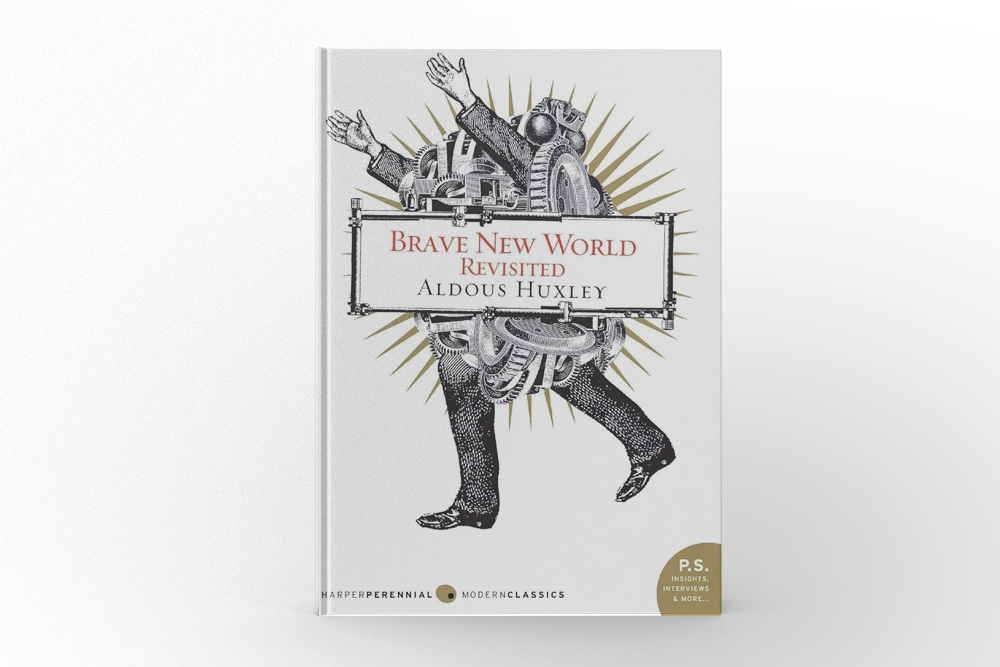“Brave New World” by Aldous Huxley is a seminal work of dystopian fiction that presents a chilling vision of a future society driven by technological advancements and social engineering. This novel, first published in 1932, explores themes of control, freedom, and the human condition.
Author’s Background
Aldous Huxley was an English writer and philosopher born in 1894. He came from a prominent intellectual family, with his grandfather being the famous biologist Thomas Henry Huxley. Aldous Huxley was a prolific author, writing novels, essays, and screenplays. His works often explored themes of science, technology, and society, reflecting his deep interest in the future of humanity. Huxley’s other notable works include “The Doors of Perception,” “Island,” and “Point Counter Point.”
In Depth Summary
“Brave New World” is set in a futuristic society known as the World State, where technological advancements and social engineering have created a seemingly perfect world. The society is characterized by its rigid caste system, where individuals are genetically engineered and conditioned from birth to fulfill specific roles. The novel begins with a tour of the Central London Hatchery and Conditioning Centre, where human embryos are artificially created and conditioned for their predetermined roles.
The story follows Bernard Marx, an Alpha Plus who feels out of place in the highly controlled society. Bernard is dissatisfied with the lack of individuality and the superficial pleasures that dominate the World State. He befriends Lenina Crowne, a Beta worker, and together they visit the Savage Reservation, a place where people live outside the control of the World State.
At the Savage Reservation, Bernard and Lenina meet John, also known as “the Savage,” who was born naturally and raised outside the World State. John is the son of Linda, a former World State citizen who was abandoned on the reservation. John is fascinated by the works of Shakespeare and holds values that starkly contrast with those of the World State.
Bernard brings John and Linda back to London, where John becomes an instant sensation. However, John’s presence disrupts the social order, and he becomes increasingly disillusioned with the World State’s values. He rejects the artificial pleasures and conformity of the society, leading to a series of confrontations with the authorities.
The novel’s climax occurs when John isolates himself in a lighthouse, seeking solace in solitude and self-punishment. However, he is unable to escape the intrusive society, and the novel ends with John’s tragic demise, symbolizing the ultimate failure to reconcile individual freedom with societal control.
Themes and Insights
“Brave New World” addresses several profound themes. One of the central themes is the tension between individuality and societal control. Huxley portrays a world where technological advancements and social engineering have eradicated individuality, leading to a loss of personal freedom and autonomy.
Another significant theme is the dehumanizing effects of technology. The World State’s reliance on technology to control and condition its citizens highlights the dangers of sacrificing human values and emotions for the sake of efficiency and stability. Huxley warns against the unchecked advancement of technology and its potential to strip away what makes us human.
The novel also explores the concept of happiness and its relationship to freedom. The World State’s pursuit of superficial pleasures and instant gratification raises questions about the true nature of happiness and whether it can be achieved without freedom and individuality. Huxley challenges readers to consider the cost of a society that prioritizes stability and control over genuine human experiences.
Personal Reflections
Reading “Brave New World” is an intellectually stimulating and thought-provoking experience. Huxley’s eloquent prose and deep insights into the human condition make the reader feel intimately connected to the characters’ struggles. The novel prompts readers to reflect on their own values and the potential consequences of technological advancements and social engineering.
Huxley’s portrayal of the World State’s dehumanizing effects is both compelling and unsettling. The novel serves as a powerful reminder of the importance of individuality, freedom, and the need to balance technological progress with human values.
Recommendation
“Brave New World” is an essential read for anyone interested in dystopian fiction, philosophy, or the future of society. Huxley’s insightful analysis and masterful storytelling make the book both intellectually stimulating and deeply moving. It is a timeless classic that continues to resonate with readers today.
Impact and Legacy
The impact of “Brave New World” has been profound. The novel is widely regarded as one of the greatest works of dystopian fiction and has influenced countless writers, thinkers, and filmmakers. Huxley’s exploration of the dehumanizing effects of technology and the tension between individuality and societal control has left an indelible mark on literary and intellectual history.
“Brave New World” has also been adapted into numerous films, plays, and other media, further extending its reach and influence. The novel’s themes of control, freedom, and the human condition continue to resonate with readers and audiences worldwide, making it a landmark work in the field of literature.
Conclusion
“Brave New World” is more than just a novel; it is a profound exploration of the human condition and the potential consequences of technological advancements and social engineering. Aldous Huxley’s masterful storytelling and deep insights challenge readers to reconsider their understanding of individuality, freedom, and the future of society. This review of “Brave New World” highlights the enduring impact of Huxley’s work and the powerful lessons it imparts.
